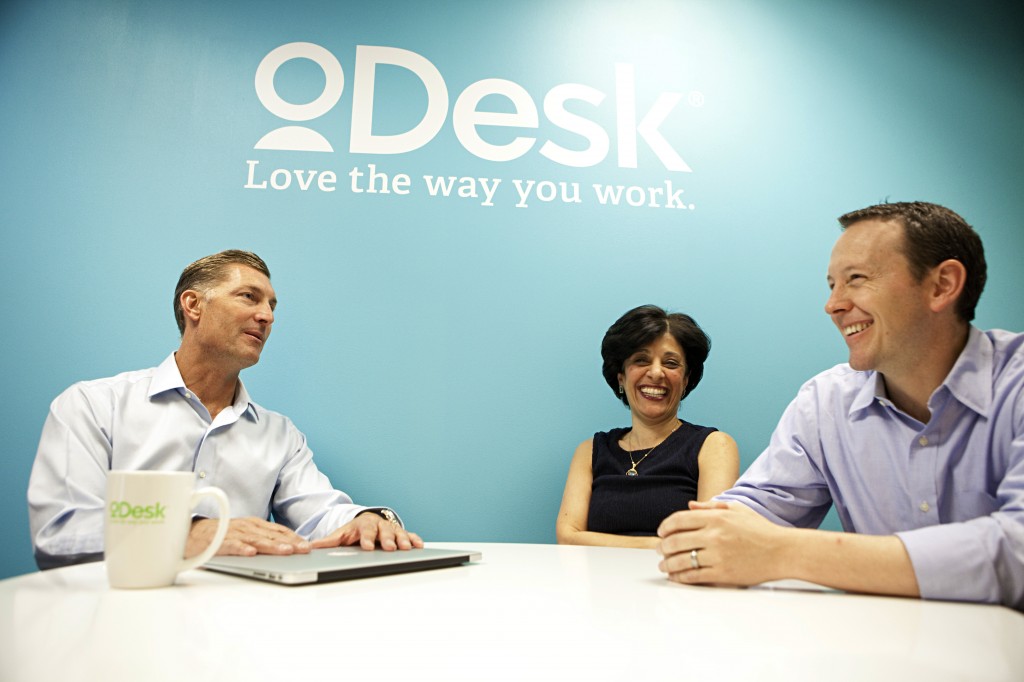HQ: Redwood City, CA
EMPLOYEES: 125
FLEX PROGRAMS:
-
Work from home Tuesdays
-
Coworking office space in San Francisco for all employees to use
-
Remote work flexibility: no set in-office hours, “extreme” remote work encouraged (when people need to be out of the country, with family, etc.), and support for parents and the demands children place on them
-
New parent programs: Mother’s Room at HQ and a baby bonus gifted to new parents
Q&A with Zoe Harte, Head of Human Resources
 1. In a nutshell, tell us about oDesk.
1. In a nutshell, tell us about oDesk.
oDesk is a leading online workplace that enables the world’s best talent and the world’s best businesses to work together, regardless of where they happen to be. In a nutshell, at oDesk, we empower people to find each other and work together via the Internet, so that there is more freedom to work flexibly. We live and breathe our own model with work-from-home Tuesdays, and by hiring from our very own network of more than five million freelancers who support our team in Redwood City at a ratio of 3-to-1.
At all levels of our company—even for our executives—balance is critically important. Our general counsel, one of the most senior executives here, coaches his daughter’s basketball team on Monday afternoons, while our VP of Marketing follows a shifted schedule that allows her to be home early and spend time with her family.
2. Your flex program allows employees to work from home on Tuesdays. When did it launch and how did it come to be?
Our flexible work program has been a part of oDesk since nearly the beginning. It was promoted by our co-founders as a way to level the field between remote workers and those working from headquarters, so that we would be more aware of what it was like for them not being onsite.
Working from home has become part of our culture. If we can’t successfully work together via the Internet within oDesk, frankly, we shouldn’t be running a business supporting millions of people working this way. Our team has more flexibility to work at the times they’re most productive, and that also supports their life balance. So long as deadlines are met and quality work is delivered, it doesn’t matter if work happens in hours that don’t map to a traditional 9-to-5. There is an inherent level of flexibility that is foundational for our culture and it is an incredible tool for recruiting.
3. How does “work from home Tuesday” really work — literally (!) — and who is it open to?
“Work-from-home Tuesday,” should probably be renamed “work online Tuesday,” meaning we can work from anywhere. The program, regardless of its official name, is open to every full-time employee. Everyone is granted the same degree of flexibility with the understanding that there will be occasions when they need to be in the office that day. The program is based entirely on trust. We have quite a bit of work to get done and it most certainly does not stop on Tuesdays. Generally, there are fewer meetings scheduled on Tuesdays, allowing people to catch up, dive deeply into a project, or have uninterrupted blocks of time to get work done.
4. What kind of feedback do you get internally about these opportunities?
It’s a sacred cow. Not only is it a great perk, but it is really a part of our culture. Not to mention, it is also a great way for us to live and breathe our business’ offering. By working online, we develop a heightened sensitivity to the issues our freelancers deal with on a daily basis. For example, if we have trouble hearing someone during a Skype call on Tuesday, we are reminded of the need to check in regularly to make sure everyone can hear properly during conference calls.
5. How would you advise another company thinking about implementing something similar — is there something that’s key to make this work well at oDesk?
(1) Though it is rare that people abuse it, make a point to check in with your managers to see how it’s going, what productivity is looking like, and how team members are responding to it.
(2) Another key to the program’s success is making sure every team member, from the CEO down, embraces and practices it. I think we’re all too familiar with the “perks” that no one takes advantage of for fear of being perceived as a “slacker.” I’m thinking of Summer Fridays, for example. If you’re the only employee who is packed up at 2 p.m. on a Friday afternoon and everyone else works until 5 or 6 p.m., you likely won’t plan to kick off your weekends early in the future.
(3) The third and arguably most important part of the program’s success is having an incredible IT team. If your company does not have the infrastructure to communicate remotely, work from home days will be nearly impossible to implement successfully.






